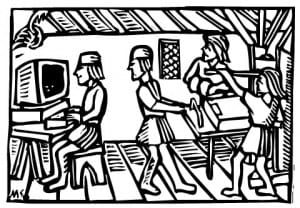Today was the inaugural meeting the University of Lincoln Teaching Academy, an initiative put together by staff in CERD and Principle Teaching Fellows. After a brief history of the development of the Academy, group discussions around the its purpose and form reflected a diverse range of topics, and reinforced the need for a forum where staff can share ideas and practice. Digital Scholarship is becoming integral to teaching and learning and while the nature of scholarship in a digital age is continually open to debate, there is a synergy between the aims of the Teaching Academy and the need for a platform where virtual policies and practices can be discussed and taken forward. A link to the Teaching Academy is on the right of this post. Please add any comments below about how you feel the Teaching Academy and the Digital Scholarship groups can work together to support teaching and learning across the university.
Digital Scholarship
Welcome to the University of Lincoln online resource area for Digital Scholarship. Originating from CERD, the Centre for Educational Research and Development, Digital Scholarship will examine how the internet is challenging and changing higher education in the 21st century.
The site will signpost resources and provide a platform for discussion and debate around institutionally supported tools for learning, such as Blackboard, as well as the affordances of externally hosted technologies for teaching, learning and research. Open academic practice and support for the appropriate digital literacies for employability and professional development will also be addressed.
A Digital Scholarship public group has been set up at http://blogs.lincoln.ac.uk/groups/digital-scholarship. If you have any queries or comments about digital scholarship at the University of Lincoln please contact Sue Watling on swatling at lincoln.ac.uk.
Digital Scholarship is one of the strands of Student as Producer and is defined in the User Guide as below;
Technology in Teaching: Digital Scholarship
Research engaged teaching implies a change in the relationship between tutor and student. This changed relationship is facilitated by web 2, and is evident in various web-based activities, for example, commons-based peer-production http://en.wikipedia.org/wiki/Commons-based_peer_production, and Personal Learning Environments based on user choice of available tools to complete educational tasks http://zope.cetis.ac.uk/members/ple.
The changing relationship between tutor and student and the emergence of the concept of Digital Scholarship can be facilitated by Web 2.0 technologies in that they embed the following characteristics:
- Identity – a way of uniquely identifying users in the system
- Messaging – a synchronous way of communicating online in real time
- Relationships – a way of describing how users within the system are related to one another
- Communities a way of forming groups with a common interest
- Reputation – a way of knowing the status other users in the system.
Tutors can demonstrate their use of technologies in teaching by the ways in which they use Blackboard and other web-based technologies, as well as other methods of enabling digitialised scholarship and collaboration between tutors and students. These might include the use of online tutorials, and the embedding of information and resource learning objects in the teaching process. Research – engaged teaching and learning is not dependent on technology, but rather on the quality of the relationship between student and teacher. In this context technology is regarded as an enabler rather than an essential ingredient of the teaching and learning process, facilitating an engaging intellectual relationship between students and staff (JISC 2009).
